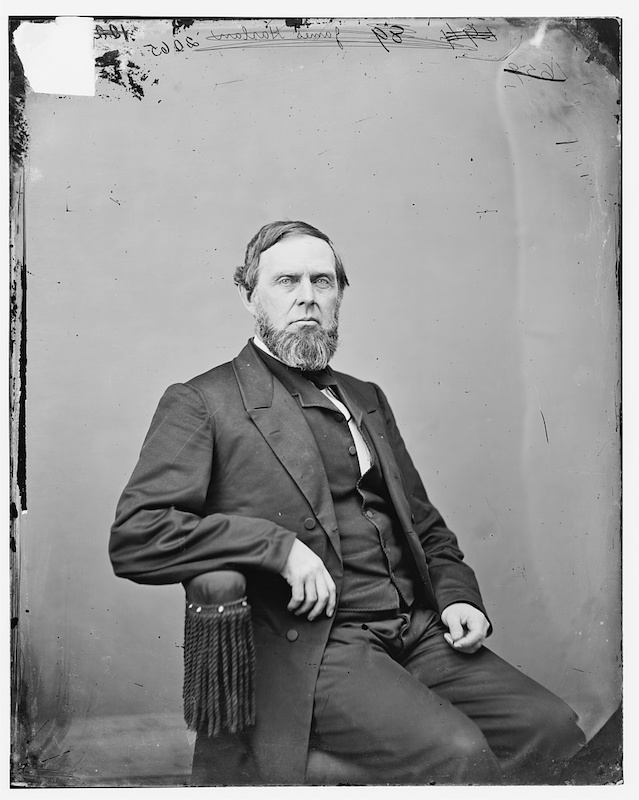
This portrait of U.S. Sen. James Harlan of Iowa was created between 1865 and 1880. Photo retrieved from the Library of Congress, https://www.loc.gov/item/2017895064/
Nov/Dec 2023 (Volume 15, Issue 6)
By Jerry Harrington
The historical legacy of James Harlan of Mount Pleasant, an early and influential political leader in the Hawkeye State during the 19th century, still stands strong today due to the indelible impact he made on the history of Iowa and the nation.
One of the founders of the Iowa Republican Party and a staunch anti-slavery advocate, Harlan was twice elected to represent Iowa in the U.S. Senate and was a significant political figure on the national stage. He was appointed by President Abraham Lincoln as Secretary of the Interior at the end of the American Civil War, making Harlan the first Iowan to serve on a federal cabinet. A close friend of Lincoln, Harlan established himself within the president’s family when the Iowan’s daughter married the Great Emancipator’s eldest son.
And Harlan has the honor — or blame — of personally firing from the Interior Department one of nation’s most honored poets of the 19th century — Walt Whitman.
Like many of the early political leaders in frontier Iowa of the mid-19th century, Harlan was not a native of the state, but was born in Clark County, Ill., on Aug. 26, 1820, and raised in Indiana. Attending local schools there, he graduated from Indiana Asbury University, which became DePauw University, in 1845.
After graduation that year, Harlan wedded Ann Eliza Peck on Nov. 5, 1845. The couple eventually had four children: Mary, Silas, William and Julia.
With a college degree in hand and a new wife at his side, Harlan looked westward and moved to Iowa City in late 1845, where he became superintendent of schools. In his spare time, he studied law and was admitted to the bar in 1850 while also becoming involved in politics, joining the Whig Party. The Whigs, opponents of the Democratic Party, held a pro-business, activist-government ideology. Harlan’s involvement in the party led the Whigs to nominate him for governor in 1850, but, shortly after winning the nomination, he discovered he fell short of the age requirement of 30 and was forced to withdraw in place of another candidate.
Harlan’s educational and legal background attracted the attention of the leaders of the Mount Pleasant Collegiate Institute, located south of Iowa City. Established in the 1840s before Iowa became a state, the institution was formed by frontier members of the Methodist Church. It was also the state’s first co-educational institution, admitting women, a rarity at the time. Harlan assumed the role of college president, serving from 1853 to 1855, when he energetically raised money for the college and initiated building and curriculum expansion to help cement the college’s long-term future. During his presidency, the institute changed its name to Iowa Wesleyan College in honor of the Methodist Church’s British founder John Wesley. (It was renamed Iowa Wesleyan University in 2015.)
In 1857, Harlan built the oldest part of what would become the Harlan House Hotel in Mount Pleasant. He would add on to the hotel again in 1880 and 1892, but ultimately bought another house in which he would live known as the Harlan-Lincoln House.
TO READ THE ENTIRE STORY AND OTHER FASCINATING STORIES ABOUT IOWA HISTORY, subscribe to Iowa History Journal.
